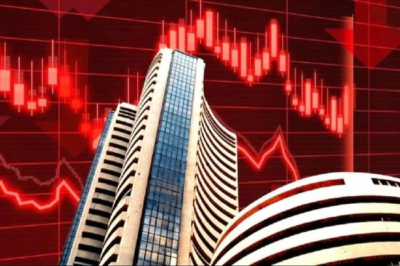
- The Sensex and Nifty dropped over 1% due to fears of new US tariffs on steel and aluminum imports.
- The rupee hit a record low, making imports costlier and raising concerns for companies with foreign debt.
- Experts warn that the stock market may remain in a “bear phase” due to weak demand, rising costs, and global uncertainties.
Why Are Investors Worried About US Tariffs?
On Monday, the Indian stock market suffered another blow as the Sensex dropped 548.79 points to close at 77,311.80, while the Nifty50 lost 178.35 points to end at 23,381.60. This marked the fourth consecutive session of losses. The primary reason behind this downturn was US President Donald Trump’s latest warning about imposing tariffs on steel and aluminum imports. The news triggered panic among investors, leading to widespread selling in the market.
A weakening rupee added to the concerns, as it hit an all-time low, increasing the cost of imports and creating financial pressure on companies with foreign loans. With investors becoming cautious, many moved their money to safer assets like gold. The metal sector was one of the worst hit, with the Nifty Metal index dropping by 2.6%. Major companies like Tata Steel, JSW Steel, Hindalco, and Vedanta suffered heavy losses.
The broader market also felt the heat, as midcap and smallcap stocks took a sharp hit. The Nifty Midcap 100 and Smallcap 100 indices fell by 2.1% each. Banking and FMCG stocks also struggled due to weak earnings growth and rural demand concerns. IT stocks remained under pressure due to global economic uncertainty.
What’s Next for the Stock Market?
Analysts believe that market volatility is likely to continue. Economic challenges such as slower GDP growth, a depreciating rupee, high import costs, and a widening trade deficit may extend the bear phase. Investors are now waiting to see if the market can find support at the 23,200–23,050 range while facing resistance at 23,410–23,480 in the next session.
Experts advise caution and suggest that investors should focus on strong, fundamentally stable stocks rather than making risky bets in this uncertain environment.








































Leave a Reply